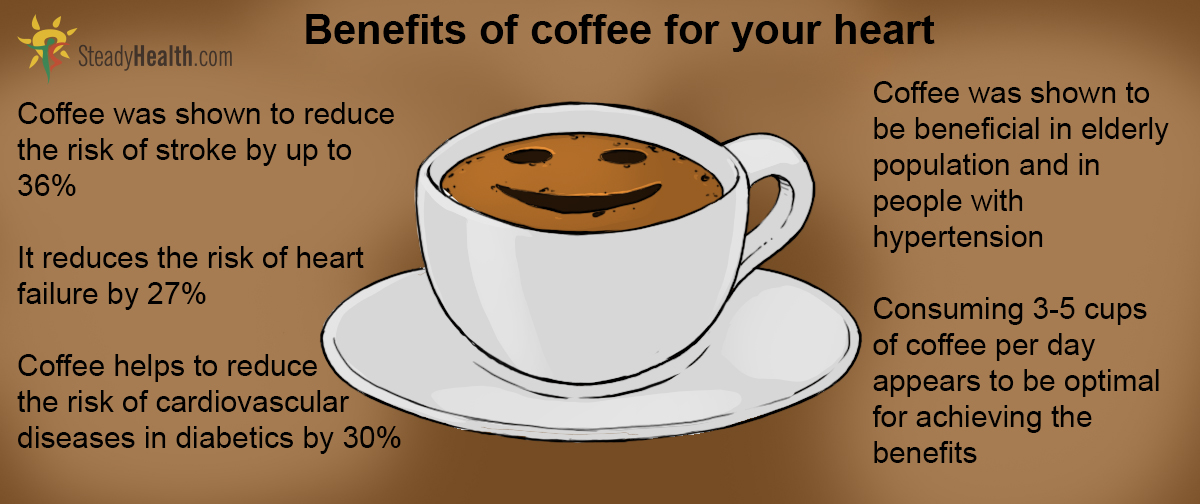Coffee has a long track record of being accused as a base of multiple ills like heart disease, diabetes, cancer, and weight gain, but a recent study indicated that coffee can do more good than harm and its health benefits may actually outweigh the risks.
Recent research studies have actually found an association of increased coffee consumption with health benefits like decreased cardiovascular mortality, protection against type 2 diabetes, liver cancer, Parkinson’s disease, decreasing the risk of depression and improving the overall cognitive function.

Coffee And The Risk Of Stroke And Heart Disease
Heart attacks or strokes are caused by disruptions in endothelial function, leading to a sudden loss of blood flow. Research supports that drinking four to five cups of coffee reduces the risk of a stroke by 36 percent, which is due to the favorable impact of coffee on endothelial function.
Another study conducted on more than 59,000 people over 19 years clearly showed the protective effects of coffee against heart failure. The study concluded that women who consumed at least a cup of coffee per day reduce their chances of heart failure by approximately 27 percent compared to those who drink no coffee at all. Also, four to five cups of coffee consumed per day by either men or women provided the strongest protection against heart failure.
In yet another study, a group of people who had suffered a heart attack were given coffee during their stay in the coronary unit. It was found that 96% of the patients showed an increase in their heart rate variability (a measure of protection against premature cardiovascular death).
Similarly, people suffering from diabetes are known to be at high risk of heart attacks because of the poor endothelial function caused by high glucose levels. A study on type 2 diabetic patients showed that patients who consumed four to five cups of coffee daily were 30 percent less likely to die from any of the cardiovascular diseases.
New Research Data From Korea: Definite Proof?
A breakthrough study was conducted by researchers in Korea, to analyze the risk of developing heart problems. They enrolled 25,138 men and women of average age 41 who underwent routine health screening tests. None of them had any signs of heart disease till then. The researchers studied their lifestyle and habits, such as alcohol consumption, smoking, food habits, and coffee consumption. All the participants underwent a CT scan to determine the level of calcium in their coronary arteries, the blood vessels that bring blood to the heart. The presence of calcium deposits is usually seen as an early sign of coronary heart disease. Over time, these calcium deposits may harden and break, thus reducing the blood flow to the heart or build up the clots that may lead to heart attacks. The scans revealed that more than 13.4 percent of the participants had calcium in their coronary arteries.
READ Is Decaffeinated Or Decaf Coffee Healthy?
After relating their lifestyle reports and their family history of heart problems, it was found that the association between coffee drinking and calcium accumulation was U-shaped. That is, participants who drank between three and five cups of coffee a day had the lowest calcium ratio of 0.59. Those who drank less than one cup a day had a calcium ratio of 0.77. Those who drank one to three cups a day had a ratio of 0.66. And among those who drank more than five cups a day, the ratio was 0.81, thus adding to the growing evidence that coffee is good for a person’s heart health.
Benefits Of Coffee To Heart Health
Although the Korean study looks very convincing, particularly taking into account a large number of participants, its limitations should be noted. First, it is not obvious that the data obtained for the Korean population will equally apply to everyone else.
A genetic predisposition to different diseases varies from one nation to another quite significantly, after all. Second, it is not clear how coffee would affect the health of people with other existing medical conditions.

Nonetheless, several research findings listed below clearly point to the significant benefits of the coffee consumption:
- Coffee contains more than 1000 different compounds which help in reducing harmful inflammation and opening the blood vessels.
- It is a source of antioxidant and anti-inflammatory molecules.
- Coffee contains a compound known as chlorogenic acid, which is capable of improving heart muscle cell health, thus reducing the risks of heart failure after a heart attack. It also inhibits the clumping of platelets that contribute to blockage of blood vessels to initiate heart attacks and strokes.
How Much Coffee Is Actually Too Much?
In the US, experts say up to 400 mg to 500 mg of caffeine a day appears to be safe for most healthy adults. One mug of instant coffee contains 100 mg and one mug of filter coffee has 140 mg of caffeine.
Research on the effect of coffee in the senior population was conducted on 700 elderly residents, out of which 485 had high blood pressure. Their blood vessels were tested using a heart scan (rigid blood vessels are a warning sign to heart problem). The results suggested that participants who drank one to two cups of strong Greek coffee (boiled coffee which is not filtered, thus is high in compounds and nutrients like flavonoids, magnesium, niacin, potassium etc) had more elasticity in their major blood vessels than those who didn’t drink coffee at all.
The Other Side
Although coffee may have fewer risks compared to its benefits, other beverages like milk, fruit juices contain some essential nutrients which coffee does not. Also, if cream or sugar is added to coffee, it adds more calories and thus, eventually, more fat to your cup. High consumption of such coffee may elevate your cholesterol levels.
For a percentage of people with a specific genetic mutation, coffee may increase the risk of the heart disease as such type of genetic mutation slows down the breakdown of caffeine in the body. So, your metabolic rate is another factor that may affect your heart health.
Also, pregnant women should limit their coffee consumption to 140-200 milligrams of caffeine per day, as a precaution, as it is said to be linked to premature birth.
READ Four Cups of Coffee Daily Beat Depression
Coffee is one of the most heavily researched products of the world. Recent studies and research clearly show that moderate coffee consumption can actually reduce the risk of developing future cardiovascular problems by improving the overall health of blood vessels.
- Wu JN, Ho SC, Zhou C, et al. Coffee consumption and risk of coronary heart diseases: a meta-analysis of 21 prospective cohort studies. Int J Cardiol. 2009 Nov 12
- 137(3):216-25
- Bohn SK, Ward NC, Hodgson JM, Croft KD. Effects of tea and coffee on cardiovascular disease risk. Food Funct. 2012 Jun
- 3(6):575-91
- Toda E, Ishida H, Aoki T, et al. Possible mechanism of preventive effects of coffee intake on the formation of arterial occlusive thrombosis. Tokai J Exp Clin Med. 2010 Dec
- 35(4):133-6
- Bidel S, Hu G, Qiao Q, Jousilahti P, Antikainen R, Tuomilehto J. Coffee consumption and risk of total and cardiovascular mortality among patients with type 2 diabetes. Diabetologia. 2006 Nov
- 49(11):2618-26
- Lopez-Garcia E. Coffee consumption, myocardial infarction and stroke: what is the association? Womens Health (Lond Engl). 2011 May
- 7(3):265-7
- Patil H, Lavie CJ, O’Keefe JH. Cuppa joe: friend or foe? Effects of chronic coffee consumption on cardiovascular and brain health. Mo Med. 2011 Nov-Dec
- 108(6):431-8.
- Mind map by SteadyHealth.com
- Mind map by SteadyHealth.com
- Photo courtesy of avhell via Flickr: www.flickr.com/photos/patdavid/14028952713


Your thoughts on this